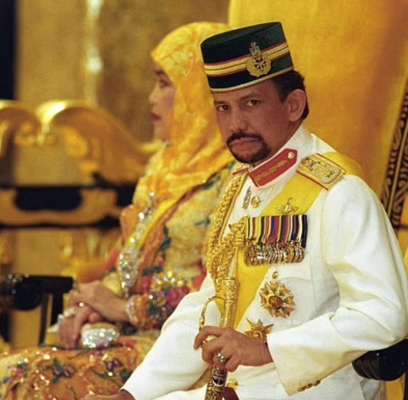Hassanal Bolkiah is the Sultan of Brunei, the small but wealthy Southeast Asian country located on the island of Borneo. As the head of state and government, he holds absolute power over the nation and has ruled Brunei for more than six decades, making him one of the longest-reigning monarchs in the world.
Early Life and Education:
Hassanal Bolkiah was born on July 15, 1946, in Bandar Seri Begawan, Brunei. He is the eldest son of Sultan Omar Ali Saifuddien III, who abdicated the throne in 1967 and played a pivotal role in modernizing the country. Sultan Hassanal Bolkiah received an elite education both at home and abroad, including at the Royal Military Academy Sandhurst in the United Kingdom, which prepared him for leadership roles in both military and civilian matters.
Ascension to the Throne:
In 1967, at the age of 21, Hassanal Bolkiah succeeded his father to become the Sultan of Brunei, following his father's abdication. His ascension occurred just a year before Brunei gained its independence from the United Kingdom in 1984. Throughout his reign, he has maintained Brunei’s neutrality in international affairs, while also overseeing significant economic development in the country.
Leadership and Governance:
As Sultan, Hassanal Bolkiah holds absolute authority over both the executive and judicial branches of government. He has maintained an absolute monarchy, with no political opposition, and has controlled the country’s political, military, and economic spheres. His governance is characterized by a mixture of Islamic law (Sharia) and a system of authoritarian rule, though he has also made efforts to modernize Brunei’s infrastructure, education, and healthcare.
Sultan Hassanal Bolkiah has been instrumental in shaping Brunei’s national identity, which is centered on its Islamic faith, cultural traditions, and oil wealth. He is known for his personal wealth, with Brunei possessing one of the highest per capita incomes in the world, largely due to its vast reserves of oil and natural gas.
Economic and Developmental Impact:
Under his leadership, Brunei has transformed into one of the world’s richest nations, with a robust welfare system that provides free healthcare, education, and housing to its citizens. His government has used the country's oil wealth to fund large-scale infrastructure projects, and Brunei continues to invest heavily in its oil and gas sector, which forms the backbone of its economy.
Despite its wealth, Brunei has maintained a conservative social outlook. Sultan Hassanal Bolkiah has overseen the implementation of strict Islamic laws, including the introduction of Sharia law in 2014, which mandates punishments like amputation for theft and stoning for adultery. These laws have attracted international criticism, but they reflect the Sultan’s dedication to his interpretation of Islamic principles.
Personal Life and Public Image:
Sultan Hassanal Bolkiah is known for his extravagant lifestyle, which includes a vast collection of luxury cars, airplanes, and a royal palace that is among the largest in the world, the Istana Nurul Iman. His personal wealth, much of which is tied to Brunei’s oil assets, has led to his being listed as one of the richest individuals globally, with a fortune estimated to be in the tens of billions of dollars.
He is married to Azrinah Salleh, and has several children. The Sultan has four sons, including his heir apparent, Crown Prince Al-Muhtadee Billah. His family plays a central role in Brunei's political and social life.
Despite his wealth and power, Sultan Hassanal Bolkiah has maintained a relatively low profile on the global stage. He is a private and reserved figure, and his policies have been largely inward-focused, with Brunei maintaining a stance of neutrality in international conflicts.
Legacy and Challenges:
Sultan Hassanal Bolkiah’s long reign has been marked by stability and prosperity, but his rule has not been without challenges. As Brunei’s wealth and reliance on oil continue to dominate the economy, the country faces the broader issue of diversification. With the global shift towards renewable energy, the Sultan’s government has begun to explore ways to reduce Brunei's dependence on oil, though the country’s relatively small population and conservative social policies make this transition complex.
Additionally, Brunei's strict interpretation of Islamic law and its human rights record have come under international scrutiny. Critics point to restrictions on political freedom, freedom of speech, and the rights of women and minorities. However, the Sultan's policies are supported by many in Brunei, who appreciate the stability and prosperity that his leadership has provided.


